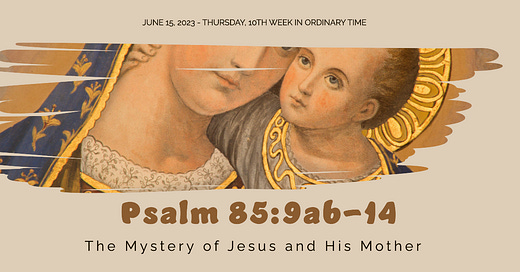Psalm 85:9ab-14
Psalm 85 is composed of two parts. Part one, verses 2-8, contains a request for forgiveness and salvation and part two, verses 9-14, includes God’s answer to the prayer of the psalmist. Surprisingly, God’s answer is given in future tense: “I will hear what God proclaims” (Ps 85:9). The psalmist has not heard God’s answer yet, but he is sure of what the answer will be: “peace for his people” (Ps 85:9). How does he know? From the history of salvation. He knows how God dealt mercifully with his people, and so he is confident that God will continue to deal with his people with mercy.
But, the psalmist goes even further in his confidence in God’s answering his prayer. He envisions a different world characterised by kindness, faithfulness, righteousness, and well-being (Ps 85:11-13). God’s steadfast love and faithfulness emphasise God’s fidelity. Even if we are unfaithful, God remains faithful to His covenant with us. On the other hand, righteousness and peace describe a world redeemed by God’s grace.
It is interesting to recall that the tradition of the Church connected this psalm with the mystery of Jesus Christ and His Immaculate Mother. The meaning of Jesus’ name is “God saves”. Psalm 85 tells us God’s “salvation is near to those who fear him” (Ps 85:10). On the other hand, “our land” that “yields its produce” in verse 13 is taken as a symbol of the Blessed Virgin Mary, our Mother. She yielded the fruit of her faith on Christmas Day, giving birth to our Lord and the Saviour of the world, Jesus Christ.
In Jesus, God’s mercy and His faithfulness have met, and God’s righteousness and well-being have kissed when the eternal Word of God became flesh (John 1:14). The Word of God looked from heaven at our wretched conditions with compassion and came down from God to dwell among us. Jesus is the truth (John 14:6). Jesus reveals to us the Father, but he also reveals to us what it means to be fully human. Jesus is our righteousness (1 Cor 1:30). As Saint Paul says, we “all are justified freely by his grace through the redemption that came by Christ Jesus” (Rom 3:24). With Jesus’ incarnation, God’s glory dwelled in our land (see Ps 85:10).
At the end of our psalm, we hear that “the LORD himself will give his benefits”. The word “benefits” is actually “good”. This word appears seven times in the story of creation in Genesis 1. With the coming of Jesus Christ into the world, God again gives us what is good: deliverance from captivity, mercy, and well-being. In Jesus Christ, the Father gives us a joyous life that does not end.




